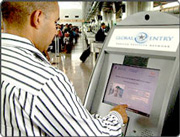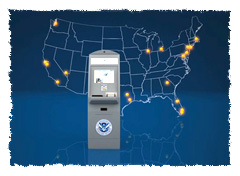|
|
||
The Trusted Traveler
Here are the details for each program: Global Entry http://www.globalentry.gov Created and administered by U.S. Customs and Border Protection (CBP), Global Entry allows pre-approved travelers to expedite their entry into the U.S. The program has a strict membership standard (background check, fingerprinting, in-person interview, etc.). However, once approved, you can use automated kiosks in most major U.S. airports, rather than having to go through the traditional arrival process. Bypassing long lines is the major benefit, but there are other perqs, including not having to fill out the (paper) CBP 6059B customs declaration form. But you won’t qualify if you’ve ever been convicted of a criminal offense in any country or been found in violation of any customs, immigration or agricultural laws. And, of course, all bets are off if you provide false or incomplete information on your application. You need to have a current, valid passport PLUS one other form of identification such as a driver’s license or ID card. And if you are a permanent resident of the U.S. you’ll need to provide your permanent resident card. Membership in the Global Entry program is open to legal United States residents and citizens of Mexico, Canada and the Netherlands.
TSA PreCheck www.tsa.gov OK, we all love to hate the Transportation Security Administration. However, giving credit where it’s due, TSA is trying (albeit in a small way), to make the screening process easier for certain folks who participate in this program. TSA PreCheck is described as an “Expedited screening initiative" that is expanding to airports across the country. The program implements the agency’s “Intelligence-driven, risk-based approach to security,” and enhances aviation security by placing more focus on pre-screening individuals. If you qualify for PreCheck, you usually won’t have to remove your shoes (yea!), take liquids out of your carry-on, remove your laptop, or take off your lightweight jacket or belt before passing through the screening checkpoint. There’s no guarantee of this because TSA reserves the right to “incorporate random and unpredictable security measures throughout the airport,” and no one can be guaranteed expedited screening.
You'll enter your membership number (PASS ID) in the "Known Traveler Number" field when booking reservations or enter it into your frequent flyer profile. If it’s determined that you’re eligible for expedited screening, information is embedded in the barcode of your boarding pass. TSA will read that barcode at designated checkpoints and you may then be referred to a lane where you’ll have expedited screening.
Any Objections? Some people object to the very existence of these types of programs, feeling that nobody should get “special” treatment. Others are totally uncomfortable with the need to share “private” information with a government agency in order be granted access. On the first point, I refer you to this Salon article: "How the rich took over airport security." “Along with getting a photo at the Department of Motor Vehicles and sitting in a jury pool, standing in line at airport security with a mob of other people, miserable though it is, remains one of the few examples of civic equality in our increasingly oligarchic republic.” “At the moment, the model of America’s pathetic, predatory, deteriorating airline industry seems to be eking out nickels and dimes by playing crudely on the snobbery of their customers, with the use of two separate lines at the terminal gates...” “These 'trusted traveler' systems will not make America safer. Their unacknowledged purpose is to create yet another area of American society that is privatized and segregated by class, to the benefit of the mostly white economic overclass.” Harsh stuff... Regarding the second point: not wanting to undergo the pre-screening process, that’s entirely up to you. It’s not pleasant to be fingerprinted and questioned but I can tell you that the experience was not nearly as bad as I anticipated. If you believe that you’re giving up too much private information, then nobody’s forcing you to participate. However, privacy is pretty much dead anyway. Massive databases containing your personal info ALREADY exist and (IMO) the incremental data points that might get added to them through the Global Entry / PreCheck programs are not going to make the slightest difference in the “privacy” you now enjoy. However, I guarantee you’ll definitely appreciate the first time you walk through the checkpoint scanner with your shoes on.
|


